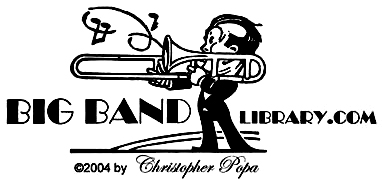
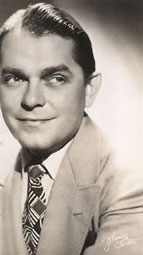
FRANKIE MASTERS
"Easy Listening"
by Christopher Popa March 2006
Amiable or pleasant were words used when describing his personality, his vocals, and his band. So it isn't surprising that he was able to find a loyal audience, and work mostly around the Midwest and East for more than 50 years.
"He had a good, danceable, understandable orchestra," Bud Shiffman, lead alto saxophonist with Frankie Masters from 1938 to 1942, told me. "He had such a great personality, and the orchestra was terrific!"
vital stats:
given name: Frank E. Masterman
birth: Apr. 12, 1904, St. Marys, WV
death: Oct. 28, 1990, acute myocardial infarction
father: William Masterman
mother: Alice Evans Masterman
wife: Phyllis Miles, d.
high school: Robinson, IL
college: Indiana University, Bloomington, IN (majored in Commerce)
residences: incl. 309 W. Pine St., Robinson, IL (to 1923);
337 S. Cuyler Ave., Oak Park, IL (1924); Westwood, CA (1946);
132 Turkey Hill Rd., Cary, IL (1957-)
But the "bell-tone" gimmick was never allowed to overtake things, and, every once in a while, the instrumentalists throw in an especially tasty lick or take on an unexpected arrangement.
"Oh yeah," Shiffman agreed. "I played a few solos on a couple of records, but I have no idea what the... who knew in those days to keep track of the records that we were making?"
A number of recordings listed above are Masters' genial vocals. Beyond them, for instance, Daddy was never as groovy when Sammy Kaye played it. How about that boogie piano solo in G'Bye Now, the vibraphone solo on Bring Back My Bonnie to Me, the delicate Welsh air All Through the Night, and the full band sound on Rustle of Spring? And with many others imitating Glenn Miller's reed sound, listen to Masters' take on The Echo Said "No."
By the end of the 1940s, their music library was surprisingly varied and appealing; I think the band sounded better and better.
They were extremely prolific on records. All told, there were 124 sides on Vocalion, Okeh, or Columbia from 1939-42, During that same time period, they cut several hundred songs for Lang-Worth and World transcriptions.
"We were strictly a dance orchestra," Shiffman reminded. "In other words, it was not the kind of swing music like Benny Goodman, Woody Herman, that kind of a thing. As a matter of fact, when we were in New York, Metronome magazine named us the #1 hotel orchestra. And there were an awful lot of hotel orchestras around, at that time."
As part of shows in theaters, Masters had the band add in some bits of comedy.
"We used to do skits, on-stage," Shiffman reminisced, "like Take Me Out to the Ball Game. I would be the batter with my clarinet, and somebody would fake throwing a fake ball at me . . . It was very entertaining."
During that simpler time, it must have given everybody a laugh.
"It was a lot of fun," Shiffman concurred. "As a matter of fact, there was a period of time, we went out for ten weeks," Shiffman recalled, "on what was called a 'theater tour.' A week in Pittsburgh, a week in Philadelphia, a week in Washington [ D.C. ], and the people we had on the tour with us were Betty Grable, Dennis Day (from 'The Jack Benny Show'), and Rochester (from 'The Jack Benny Show'). "
Working theaters required the performers to do the exact same show, at various times throughout the day.
"Correct," Shiffman said. "It was still exciting, because we'd never stay in one place too long. I mean, a week was okay. You could take a week without any problems."
In 1938, Masters' band went into the Taft Hotel on 7th Avenue at 50th Street (that is, Times Square at Radio City) in New York, for a little over a year.
"And Frankie decided that he wanted to go out for a short time, and meet his public
in-person. Even though we had a coast-to-coast broadcast every day from the Taft," Shiffman remembered. "And they never changed... the Taft Hotel was known for never changing orchestras. They had orchestras that were there for 7, 8 years at a time! So, Frank decided he wanted to go out and meet his public, again. Vincent came in while we were still there, and he sat at a table in front of the orchestra, with the manager's wife (the manager of the Hotel). And he had flowers at the table, and he was fawning all over and everything, and we looked at each other and said, 'Uh-oh! Look out!' And that's exactly what happened. We were only supposed to be out for six weeks on the road, and then come back into the Taft. We never did go back into the Taft."
Instead, in November 1939, the band played the Essex House in New York, and, a few months later, temporarily took Guy Lombardo's place at the Roosevelt Grill.
"Kenny LaBahn replaced me in New York, when we were at the Roosevelt Grill, and my wife back in Chicago had just given birth to our first child," Shiffman mentioned. "I had made arrangements for Kenny to substitute for me when I got news about her impending birth. I was already set to leave, I had my reservations and everything. And it happened suddenly. We were onstage . . . just about ready to broadcast, we had a national broadcast, and the maitre d' came running up and said there was a phone call for me at his desk. It was my father telling me that the child had been born."
LaBahn was summoned.
"So I went home for a couple of weeks," Shiffman said. "Kenny worked for me for a couple of weeks."
The birthdate of Shiffman's son was February 20th, 1940.
Around March 1942, Shiffman left Masters and accepted an offer to join Benny Goodman's band at the Hotel New Yorker.
"I walked into a music store to buy some reeds, before I joined him, and I ran into Mahlon Clark, who was a fine clarinet player," he recalled. "And he said, 'Hey, I understand you're joining Benny.' And I said, 'Yeah, isn't that great?' And he said, 'Well, I want to wish you a lot of luck.' The problem was Mahlon had joined the band and only lasted a couple of weeks, even though he was a great player, because he couldn't establish the style that Benny wanted. Benny just assumed, 'You've heard my band, you know what I like, you know how I want you to play. If you're joining me, that's the way it's got to be.'"
In the Goodman band, Shiffman took the place of alto saxophonist Clint Neagley, and, according to him, fit in well.
"It wasn't hard at all," Shiffman stated. "I played every style of music in those days."
How did he like working with Goodman?
"That was great," he said. "I enjoyed that."
In fact, he told me that the same day he joined the Goodman band, they made a radio broadcast.
"I joined the band without a rehearsal, and we finished our first broadcast," he recalled. "And Benny came over to me, and he said, 'That was great, Bud!' And Vido Musso, who I sat next to, looked at me and he said, 'That's the first time I ever heard him call anybody by their first name.' The word with Benny was 'Pops.' 'Hey Pops, how ya doin'?' As a matter of fact, the band boy with the orchestra, his name was Popsie. So, when Benny came over and called me by my first name, the guys in the band were, kind of, astonished < chuckles >."
What about the supposed Goodman "ray"?
"That actually wasn't a stare or anything," Shiffman explained. "He was concentrating, and while he was concentrating, he'd be looking at somebody in the band. And these guys thought that, 'Oh, geez, he's after me! What did I do wrong?' But Benny told me later on, he said, 'I don't have time to teach these guys how I want them to play.' He said, 'When they joined my band, like you did, I want them to know how they're supposed to play, the style they're supposed to play.' And some of the New York guys were pretty, you know, 'It's my way or no other way!' And they only lasted a couple weeks. They were out."
The band's closing day at the Hotel New Yorker was March 12, 1942, then they went on a two-week break and Goodman married producer - critic John Hammond's sister, Alice, on March 21st.
"We got pretty close," Shiffman summoned up. "Alice was trying to teach Benny how to play bridge while we were out on the road, and I was one of the few guys who was a fairly good bridge player, at that time. So they used to make me go with them for dinner [ and ] stay with them, and we'd come back to the theater and practice playing bridge and all this and that. We got along very well and Benny confided in me, more than he did with anybody else in the band, because I was with him so much."
Among the Goodman recordings Shiffman was on were Peter and the Wolf, We'll Meet Again, and All I Need Is You, the latter two with Peggy Lee's vocals.
But he didn't keep track of every move the band made.
"You were a musician, you played," he reasoned. "You didn't think about the future, that people were going to ask things about the bands you were in. It was a common thing. There were so many bands around - Glenn Miller and Woody Herman and Jimmy Dorsey and Tommy Dorsey. And most of the bands knew the guys in the other bands. We would run across each other. Like, for instance, in New York, when I was with Benny at the New Yorker Hotel, we had Sundays off, I believe. And we'd go over to the Pennsylvania Hotel and hang out with Tommy Dorsey's band."
Toward the end of May, the Goodman band went into the Paramount Theatre in New York City, which was a prestigious location to play. Still, Shiffman said it wasn't a matter of rivalry between bands.
"No, there was enough work around for everybody," he felt.
His service with Goodman ended around the third week of July 1942, when Shiffman had to go home.
"My dad got very ill back here in Chicago," he explained. "And I was an only child and it was one of those things. We were coming off of a road trip and I wanted to get back. As a matter of fact, if I would have stayed on two weeks longer, I would have had my transportation paid, because the Benny Goodman Orchestra came into the Chicago Theatre. But I couldn't wait those two weeks. I had to get out. And my roommate on the band was Dick Haymes."
He decided to stay put in Chicago and, being a talented musician, easily found employment.
"I was a good player," he acknowledged. "I could sight-read anything that was put in front of me."
After the big bands' popularity faded, he was on the staff of a Chicago radio station, became an orchestra leader at the Latin Quarter nightclub in 1946 and '47, was with David LeWinter at the Pump Room for a year or so, and spent two decades accompanying productions at the Shubert Theatre.
During those days, who did Shiffman enjoy hearing on alto?
"Well, I liked quite a few of the guys, I mean the outstanding guys. Hymie Schertzer, for one," Shiffman said. "I really gravitated toward the black players, because I was into jazz so much."
Benny Carter and Willie Smith were among those to whom he listened.
"And I used to sit in with Earl Hines, 'Father' Hines' band, on the South Side, at the club, after the last show," he said. "There was another white tenor saxophone player, Joe Masik, and myself, who were the only white guys who ever sat in with Earl Hines' band. And we got to know those guys very well. We used to go out and eat with them after they were through. In those days, you could go anywhere on the South Side without any trouble. When I stop to think of it, boy, I got around quite a bit!"
Masters was elected to the American Federation of Musicians, Local 10 in Chicago, on February 13, 1924.
"He was a banjo player," Shiffman specified.
During the day, Masters worked in the accounting department at Western Electric, and, for several nights each week, he strummed his banjo and sang with small musical groups for weddings and society dances. Even then, he was thought of as agreeable.
"Very personable. Very," Shiffman remarked. "He got along with people. He made friends easily."
In 1927 and '28, Masters made his first recordings, for Victor. Then, in 1929, business moguls Balaban and Katz offered him a job as leader of the house band at their Tivoli Theatre, on South Cottage Grove Ave. The group, totaling at one point 26 men, including a full string section and two French horns, could accompany silent films or be featured between screenings, on-stage.
"And that was where he became very close friends with Guy Lombardo, because Guy Lombardo was working at the Granada Cafe, which was in the same block as the Tivoli Theatre," Shiffman noted. "In the old days, we used to have stage shows at [ to name just three examples ] the Tivoli Theatre, and the Riviera Theatre on the North Side, and the Marbro Theatre on the West Side, and they all had house orchestras."
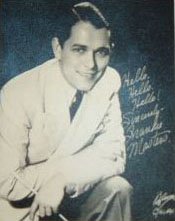
After a short period, Balaban & Katz had Masters alternate with saxophonist Benny Krueger's band, which played the Uptown Theatre, on Broadway at Lawrence. Every six months or so, Masters would swap locations with Krueger.
But by the mid'30s, the movies had become more sophisticated and
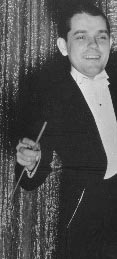
entertaining, including, for instance, the lavish Busby Berkeley films and the series of Fred Astaire and Ginger Rogers pictures.
So around 1936, Masters decided to switch to a different portion of the music business, playing hotels, such as the Terrace Casino in the Morrison Hotel.
"Every hotel had a house band," Shiffman remembered. "A 'hotel orchestra' was an orchestra that was strictly for dancing."
There were shows, dinner, and dancing, including noon sessions. And then, Masters moved on to the College Inn, on the lower level of the Sherman Hotel, Shiffman, where he stayed for 5 years.
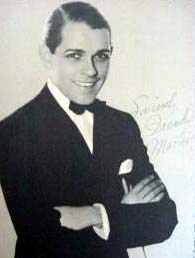
According to a discography of Masters' band, Shiffman joined him by 1938.
"I was what we call a 'jobbing' musician," Shiffman related. "He was part of the MCA Corporation, Music Corporation of America. And they had a big office here in town that handled most of the orchestras at the hotels and all that. And I was with another orchestra (a local orchestra), Sol Wagner, at the Via Lago Cafe on Wilson Avenue. When orchestras used to come into town, to play the Empire Room [ of the Palmer House ] or the Stevens Hotel or the College Inn at the Sherman Hotel, if they came in minus a saxophone player, I was on call. That's how come I got to play with Shep Fields."
"Either a saxophone player had left them or they had fired a saxophone player for one reason or another," he continued. "So I was called on because I could go right down, I didn't have to have any rehearsals. I was considered a top sight-reader of music, at that time. And no matter what the style of the band was, I fit right in without a rehearsal. I could join right away and nobody knew any better than that. So I was with a local band, and Frankie Masters was at the College Inn of the Sherman Hotel, and he needed a saxophone player. The head of MCA's office here in Chicago was a friend of mine, because I had done some work for him. And so he asked me if I would join the Frankie Masters Orchestra. I didn't know anything about it, and I asked him, 'Was it something I would like to do?' He said, 'You'll love it.' So I joined Frankie at the College Inn of the Sherman Hotel."
Masters no longer featured his banjo.
"No, no, no. He never played with the band," Shiffman recalled. "He was strictly the leader. He was the man."
One of Masters' duties was as m.c.
"The people who used to come dance to our orchestra, he would smile and talk with them, if they came up to talk to him," Shiffman recalled. "He would spend time with them . . . he wasn't standoffish in any way."
Also, Masters sang many of the songs which the band performed.
"He wasn't a Perry Como or a Frank Sinatra, but he was a good... just a good singer, you know," Shiffman commented. "I mean, he got the lyrics across and people could understand what he was singing and what he was saying."
"I can give you the names of everybody in the band," Shiffman claimed.
As if to prove it, he started reeling them off.
"Carl Bean, he was a composer. He wrote several tunes. As a matter of fact, he's one of the guys, with Kahn Keene, the trombone player, who wrote Scatter-Brain. The two of them wrote together."
Masters also received composer credit for the song.
"That came out of a warm-up they had gotten into playing, before going on stage," Shiffman revealed. "< sings > Da-de-dah-
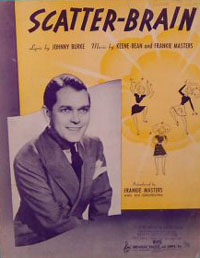
dah-dah... so they made the tune
Scatter-Brain out of it, which became a big hit."
Masters' record held the #1 spot on the charts for eight weeks.
"Well, actually, it didn't change things. We were busy all the time," Shiffman said..
"Let me see," he continued. "Vince Ferrini was the other alto player. Howie Barkell was, like, semi-manager of the orchestra. Bus Dillon was the drummer, who later went with Fred Waring's orchestra. He was a good player, good guy. The piano player was Woody Kessler, from New York. The bass player, excellent bass player, Owen Crippen was his name. Of course, my best friend in the orchestra was the lead trumpet player, Jay Mathews. His real name is Mathis."
Were they roommates when the band traveled?
"Uh, no, we were pretty good in those days," Shiffman answered. "We all had seperate rooms on the road. And Norvelle Price was the second trumpet player. He was from Tulsa, Oklahoma. Kahn Keene was the trombone player, lead trombone player. Then Jerry somebody [ Jerry Borshard ] joined us in New York, at the Taft Hotel."
Masters also employed a female vocalist.
"When I first joined the band, the girl singer was Marion Francis," Shiffman recalled. "She married the trainer for the [ Chicago ] White Sox, at that time. I don't remember what his name was. And when she left the band, Phyllis Miles came in to sing."
The boy singer was Harlan Rogers.
"Very good, soprano-type, high voice," he commented.
Even Shiffman was called upon by Masters to sing.
"Well, he had a group called The Masters Voices, which comprised some of the guys in the band, including me," he reported. "Oh, the singing was okay. But playing was the big part for me."
Did Shiffman ever switch to tenor or baritone?
"No, no. I was strictly alto, clarinet, and flute," he said.
recommended listening - select list:
When Winter Comes Marion Francis and Frankie Masters, vocal
Vocalion, 1939
Take Me Out to the Ball Game The Masters Voices, vocal
Vocalion, 1939
Scatter-Brain Frankie Masters, vocal Vocalion, 1939
Fools Fall in Love Marion Francis, vocal Vocalion, 1940
The Breeze and I Marion Francis, vocal Vocalion, 1940
That's for Me Frankie Masters, vocal Okeh, 1940
Margie The Swing Masters, vocal Okeh, 1940
Bring Back My Bonnie to Me The Swing Masters, vocal
World, 1940
Oh! Look At Me Now Frankie Masters and The Swing Masters, vocal Okeh, 1941
G'bye Now Frankie Masters, vocal Okeh, 1941
Daddy The Swing Masters, vocal Okeh, 1941
Saturday Night The Swing Masters, vocal Okeh, 1941
Under Blue Canadian Skies Frankie Masters and The Masters Voices, vocal Okeh, 1941
'Tis Autumn Lew Hurst, vocal World, 1941
Somebody's Thinking of You Tonight Phyllis Myles, vocal Columbia, 1942
Boogie in F World, 1942
All Through the Night World, 1942
Why Don't We Do This More Often? Frankie Masters and the band, vocal World, 1942
Broadway World, 1942
This Time the Dream's On Me Phyllis Miles, vocal World, 1942
Rustle of Spring World, 1942
People Like You Frankie Masters, vocal Lang-Worth, 1947
On the Other End of a Kiss Phyllis Miles, vocal Lang-Worth, 1947
Love and the Weather Frankie Masters, vocal Lang-Worth, 1949
The Echo Said "No" Phyllis Miles, vocal Lang-Worth, 1949
Each one of the above recordings has something going for it, including, on the earliest ones, Masters' famous, staggered "bell-tone" sound.
"Just like Shep Fields had the 'bubbling' rhythm, he had the bell-tone thing," Shiffman reported. "It was a very intricate style of music, where the guys in the band - like the saxophone section - would play one note of a triplet. Each guy played one note < sings > bah-bah-bah bah-bah-bah, dah-dah-dah
dah-dah-dah. But instead of each one playing three notes, and the next guy three notes and everything, it was saxophone - saxophone - saxophone, saxophone - saxophone - saxophone, on an individual note. It was very complicated, at that time, believe, 'cause it had to be timed exactly. You had to know exactly what your partners in your section were doing."
Masters autographed his forehead, while Shiffman's signature is below the name of the month.
When was the last time Shiffman saw Masters?
"It was here in town, and it was a surprise birthday party for him, that one of the saxophone players that worked with him after I had been with him, a guy by the name of Roger Malambri, at his house," Shiffman said. "He threw a surprise birthday party for Frankie's birthday. And Frank and Phyllis showed up there."
Among the well-wishes that day was a long-distance phone call from Duke Ellington.
Masters passed away at age 86, in 1990.
This month, Shiffman will turn 94; he was born March 20, 1912.
Up until last August, he had been playing with an 18-piece rehearsal band, the R.C. or "Rhythm Club" band, composed of some of Chicago's top musicians. He had to drop out, following a brief hospital stay for a bladder infection, until he fully regains his strength.
"I'm going to try and get back and do one of the rehearsals there, to honor my birthday," he proposed. "I want to be able to say I played when I was 94 years old < laughs>."
Otherwise, he's unimpressed with much of today's entertainment, judging by the recent Super Bowl half-time show which featured The Rolling Stones, including their lead singer, Mick Jagger.
"All he did was walk up and down the stage, with the microphone in his hand, yelling the same things over and over again," Shiffman remarked. "You couldn't understand any of the lyrics. In other words, Frankie's orchestra was understandable. You knew, when the singer got up to sing, you could understand exactly what they were saying. It was lovely. It wasn't raucous. It wasn't sexual... you know, the things that are going on today. It was pure music."
sources:
American Federation of Musicians, The. "Application Blank" for Frank E. Masterman,
Jan. 1924.
Brochure, "Frankie Masters and His Orchestra: The Band That Makes the Party," ca.1960s.
Epple, Bill. "His Band Plays On: The crowds still turn out for Frankie Masters, who started
making music in the 1920s," Chicago Sun-Times, "Chicago Style," May 6, 1979.
Garrod, Charles. Frankie Masters and His Orchestra (Zephyrhills, FL: Joyce Music, 1989).
Heise, Kenan. "Frankie Masters, 86; Directed Big Bands in Chicago Hotels,"
Chicago Tribune, Oct. 31, 1990.
Shiffman, Bud. Interview with the author, Feb. 18, 2006.
State of Illinois. "Medical Certificate of Death" for Frank Masters, Oct. 1990.
Whitburn, Joel. Pop Memories 1890-1954 (Menomonee Falls, WI: Record Research, Inc.,
1986), pp.300-301.
send feedback about Frankie Masters: "Easy Listening" via e-mail
return to Biographical Sketches directory
go to Big Band Library homepage
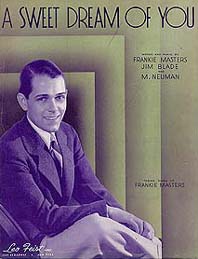
Starting in the late '40s, Masters spent ten years in the Boulevard Room of the Stevens (later named the Conrad Hilton) Hotel in Chicago, and played, at various times, proms, parties, dinner dances, conventions, and trade shows.
"In those days, people went everywhere," Shiffman looked back. "The Aragon Ballroom was full all the time. The Trianon Ballroom was full all the time. The Edgewater Beach Hotel boardwalk was full all the time. I mean, people were dancing all over the place."
At some point (he isn't sure when), he played with Masters again, briefly.
"We were very compatible," he observed. "Still doing the same sort of thing. Still popular, still hotel-style dance music. That's what people wanted, in those days."
Masters made a total of 24 recordings for Vogue, MGM, and Utopia between the mid-'40s and the mid-'50s, recorded an album in stereo for Mercury around 1960, and continued performing for years afterwards, adding in parks, the City of Chicago's 4th of July show, even opening one of the Cubs' baseball games at Wrigley Field singing The Star Spangled Banner.
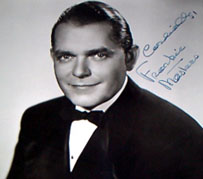
Frankie Masters: In His Own Words
"I surely didn't know much about conducting. But you know, at that time Victor Young - who later became a world-famous composer and conductor in Hollywood - was an arranger for Balaban & Katz. Victor was most kind to me. He taught me everything I know to this day about conducting."
"As a very young man, living in Hyde Park, Mel Torme used to come to the Tivoli Theater, seeking encouragement . . . His voice has gained even more over the years and I believe he's one of the most talented people we now have."
"Sometimes I think the Brazilians are the most tasteful musicians in the world. Nothing is overstated. Everything resolves."